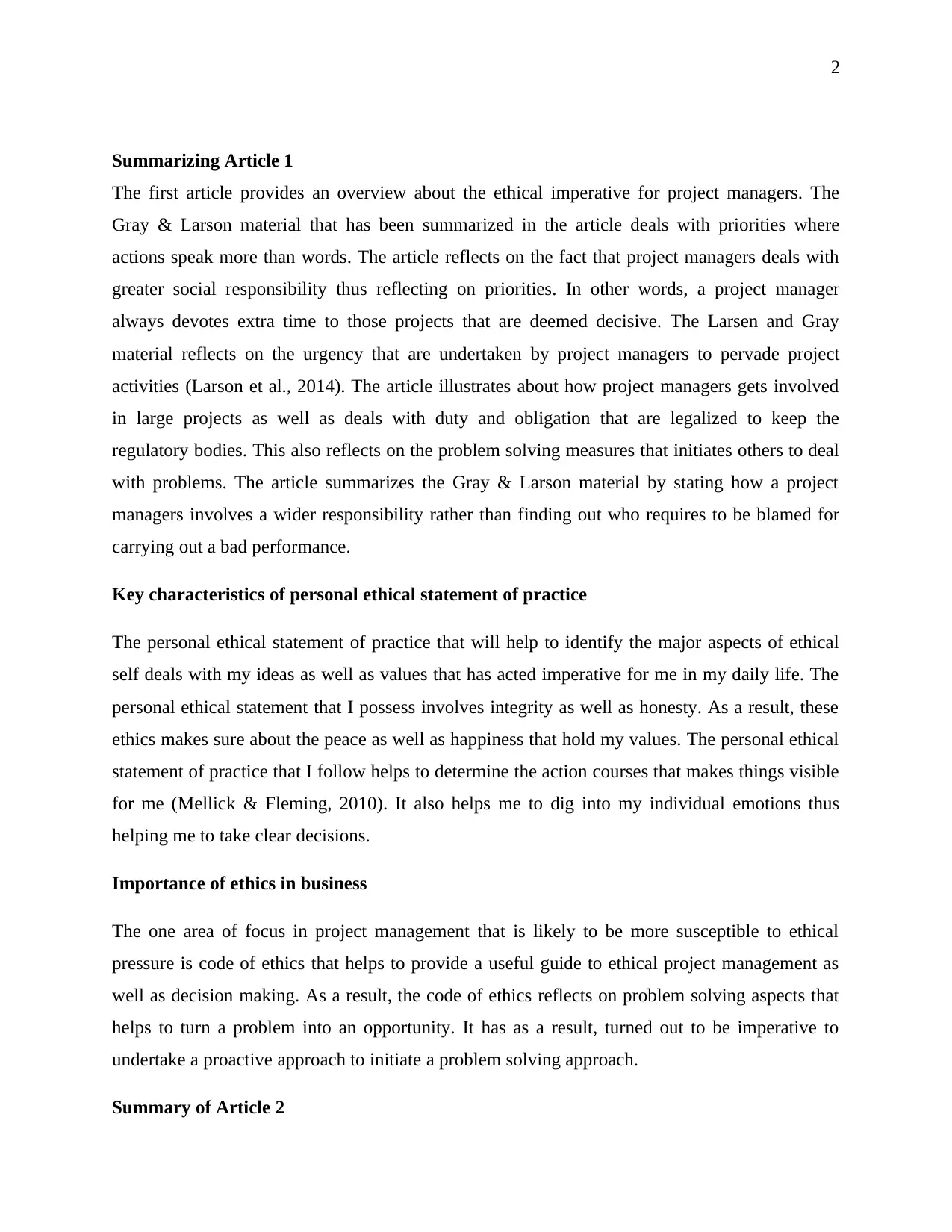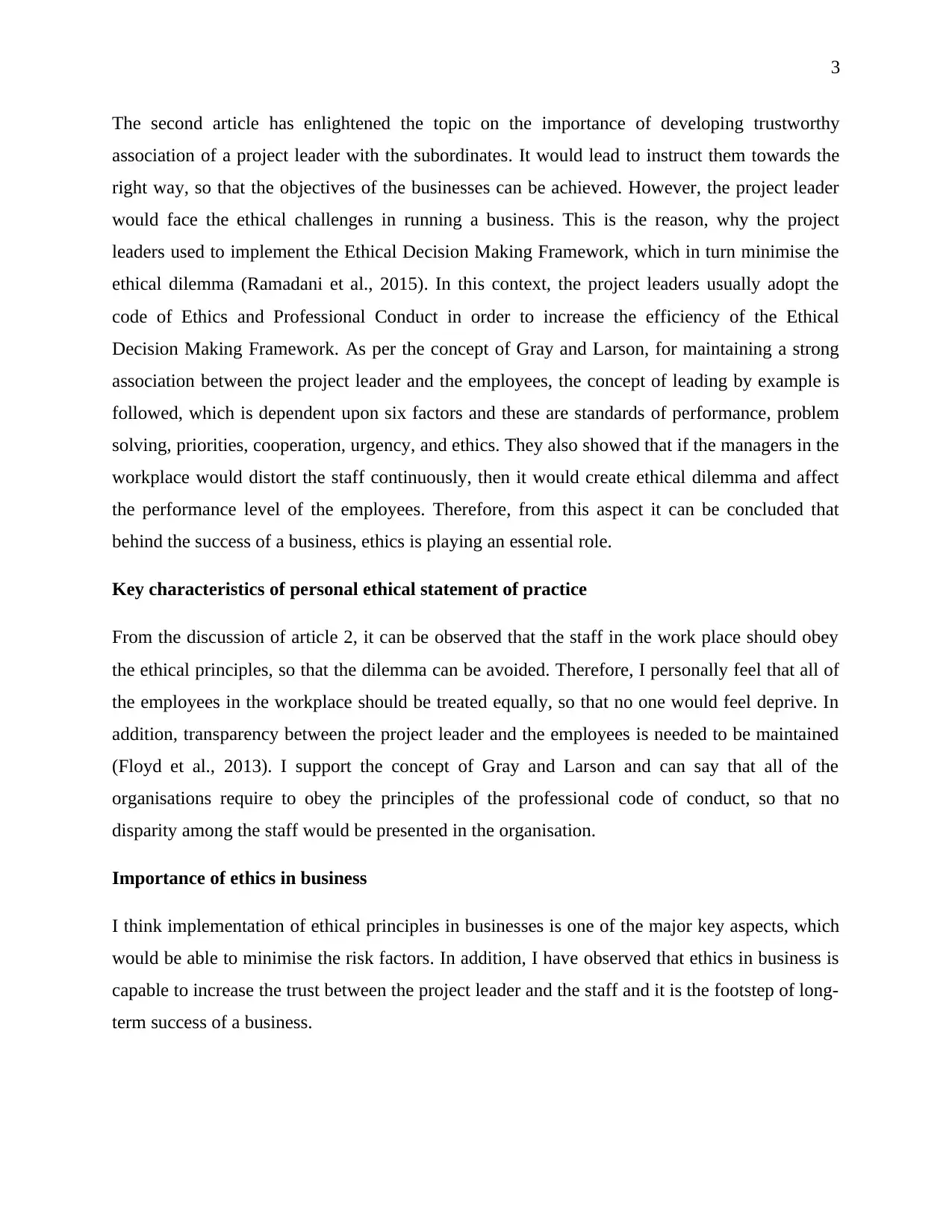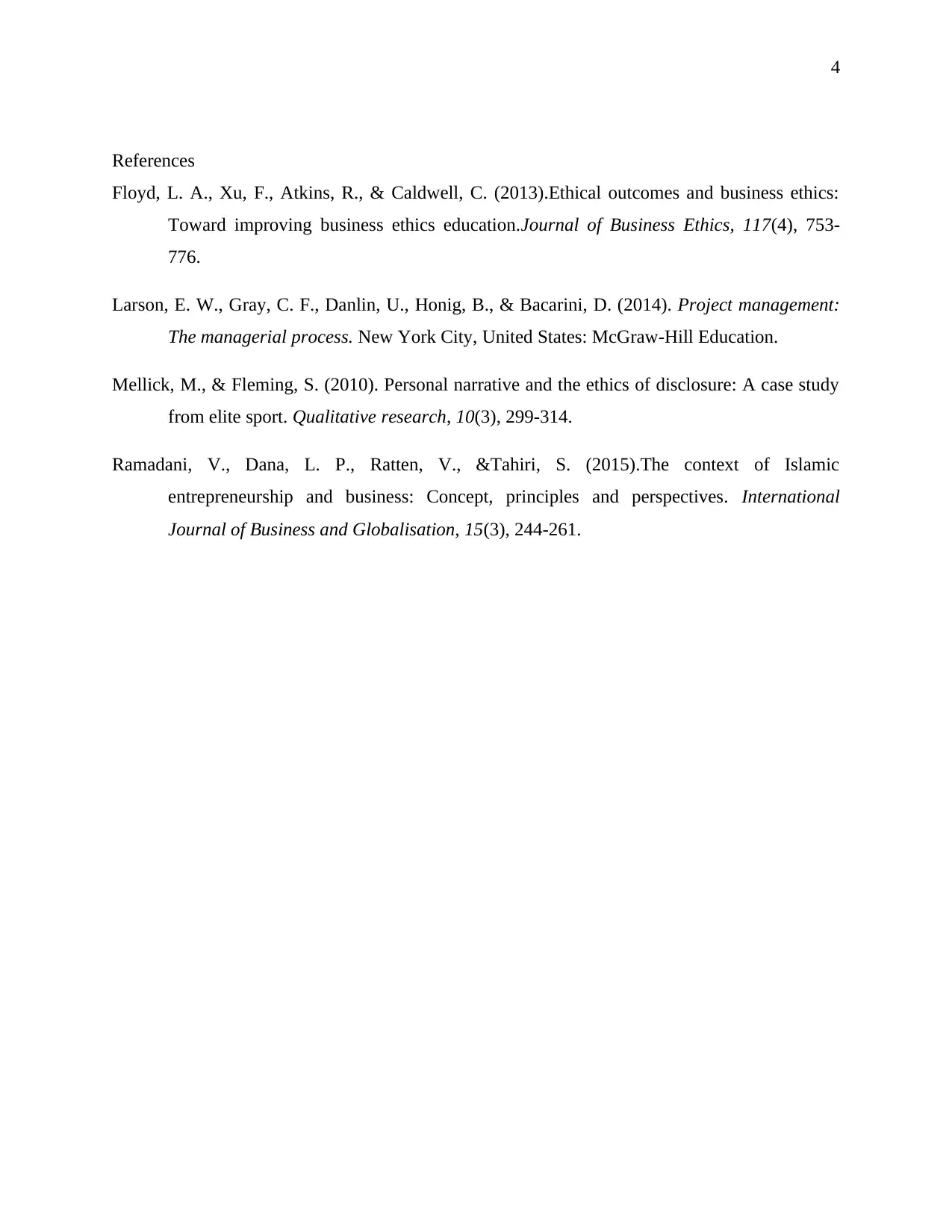Summarizing Articles on Ethical Imperatives in Project Management
VerifiedAdded on 2023/04/26
|4
|1009
|477
Report
AI Summary
This report provides summaries of two articles focusing on ethical imperatives for project managers, drawing on the work of Gray & Larson. The first article emphasizes the social responsibility of project managers and their prioritization of decisive projects, highlighting the importance of ethical conduct in bidding and project execution. It reflects on the need for project managers to address problems proactively rather than assigning blame. The second article discusses the significance of developing trustworthy relationships between project leaders and subordinates, and how ethical decision-making frameworks and codes of conduct minimize ethical dilemmas. It underscores the importance of leading by example and maintaining transparency to foster trust and long-term success. Both summaries are followed by personal reflections on ethical practices and their importance in business.

1
Project Management
Project Management
Paraphrase This Document
Need a fresh take? Get an instant paraphrase of this document with our AI Paraphraser

2
Summarizing Article 1
The first article provides an overview about the ethical imperative for project managers. The
Gray & Larson material that has been summarized in the article deals with priorities where
actions speak more than words. The article reflects on the fact that project managers deals with
greater social responsibility thus reflecting on priorities. In other words, a project manager
always devotes extra time to those projects that are deemed decisive. The Larsen and Gray
material reflects on the urgency that are undertaken by project managers to pervade project
activities (Larson et al., 2014). The article illustrates about how project managers gets involved
in large projects as well as deals with duty and obligation that are legalized to keep the
regulatory bodies. This also reflects on the problem solving measures that initiates others to deal
with problems. The article summarizes the Gray & Larson material by stating how a project
managers involves a wider responsibility rather than finding out who requires to be blamed for
carrying out a bad performance.
Key characteristics of personal ethical statement of practice
The personal ethical statement of practice that will help to identify the major aspects of ethical
self deals with my ideas as well as values that has acted imperative for me in my daily life. The
personal ethical statement that I possess involves integrity as well as honesty. As a result, these
ethics makes sure about the peace as well as happiness that hold my values. The personal ethical
statement of practice that I follow helps to determine the action courses that makes things visible
for me (Mellick & Fleming, 2010). It also helps me to dig into my individual emotions thus
helping me to take clear decisions.
Importance of ethics in business
The one area of focus in project management that is likely to be more susceptible to ethical
pressure is code of ethics that helps to provide a useful guide to ethical project management as
well as decision making. As a result, the code of ethics reflects on problem solving aspects that
helps to turn a problem into an opportunity. It has as a result, turned out to be imperative to
undertake a proactive approach to initiate a problem solving approach.
Summary of Article 2
Summarizing Article 1
The first article provides an overview about the ethical imperative for project managers. The
Gray & Larson material that has been summarized in the article deals with priorities where
actions speak more than words. The article reflects on the fact that project managers deals with
greater social responsibility thus reflecting on priorities. In other words, a project manager
always devotes extra time to those projects that are deemed decisive. The Larsen and Gray
material reflects on the urgency that are undertaken by project managers to pervade project
activities (Larson et al., 2014). The article illustrates about how project managers gets involved
in large projects as well as deals with duty and obligation that are legalized to keep the
regulatory bodies. This also reflects on the problem solving measures that initiates others to deal
with problems. The article summarizes the Gray & Larson material by stating how a project
managers involves a wider responsibility rather than finding out who requires to be blamed for
carrying out a bad performance.
Key characteristics of personal ethical statement of practice
The personal ethical statement of practice that will help to identify the major aspects of ethical
self deals with my ideas as well as values that has acted imperative for me in my daily life. The
personal ethical statement that I possess involves integrity as well as honesty. As a result, these
ethics makes sure about the peace as well as happiness that hold my values. The personal ethical
statement of practice that I follow helps to determine the action courses that makes things visible
for me (Mellick & Fleming, 2010). It also helps me to dig into my individual emotions thus
helping me to take clear decisions.
Importance of ethics in business
The one area of focus in project management that is likely to be more susceptible to ethical
pressure is code of ethics that helps to provide a useful guide to ethical project management as
well as decision making. As a result, the code of ethics reflects on problem solving aspects that
helps to turn a problem into an opportunity. It has as a result, turned out to be imperative to
undertake a proactive approach to initiate a problem solving approach.
Summary of Article 2

3
The second article has enlightened the topic on the importance of developing trustworthy
association of a project leader with the subordinates. It would lead to instruct them towards the
right way, so that the objectives of the businesses can be achieved. However, the project leader
would face the ethical challenges in running a business. This is the reason, why the project
leaders used to implement the Ethical Decision Making Framework, which in turn minimise the
ethical dilemma (Ramadani et al., 2015). In this context, the project leaders usually adopt the
code of Ethics and Professional Conduct in order to increase the efficiency of the Ethical
Decision Making Framework. As per the concept of Gray and Larson, for maintaining a strong
association between the project leader and the employees, the concept of leading by example is
followed, which is dependent upon six factors and these are standards of performance, problem
solving, priorities, cooperation, urgency, and ethics. They also showed that if the managers in the
workplace would distort the staff continuously, then it would create ethical dilemma and affect
the performance level of the employees. Therefore, from this aspect it can be concluded that
behind the success of a business, ethics is playing an essential role.
Key characteristics of personal ethical statement of practice
From the discussion of article 2, it can be observed that the staff in the work place should obey
the ethical principles, so that the dilemma can be avoided. Therefore, I personally feel that all of
the employees in the workplace should be treated equally, so that no one would feel deprive. In
addition, transparency between the project leader and the employees is needed to be maintained
(Floyd et al., 2013). I support the concept of Gray and Larson and can say that all of the
organisations require to obey the principles of the professional code of conduct, so that no
disparity among the staff would be presented in the organisation.
Importance of ethics in business
I think implementation of ethical principles in businesses is one of the major key aspects, which
would be able to minimise the risk factors. In addition, I have observed that ethics in business is
capable to increase the trust between the project leader and the staff and it is the footstep of long-
term success of a business.
The second article has enlightened the topic on the importance of developing trustworthy
association of a project leader with the subordinates. It would lead to instruct them towards the
right way, so that the objectives of the businesses can be achieved. However, the project leader
would face the ethical challenges in running a business. This is the reason, why the project
leaders used to implement the Ethical Decision Making Framework, which in turn minimise the
ethical dilemma (Ramadani et al., 2015). In this context, the project leaders usually adopt the
code of Ethics and Professional Conduct in order to increase the efficiency of the Ethical
Decision Making Framework. As per the concept of Gray and Larson, for maintaining a strong
association between the project leader and the employees, the concept of leading by example is
followed, which is dependent upon six factors and these are standards of performance, problem
solving, priorities, cooperation, urgency, and ethics. They also showed that if the managers in the
workplace would distort the staff continuously, then it would create ethical dilemma and affect
the performance level of the employees. Therefore, from this aspect it can be concluded that
behind the success of a business, ethics is playing an essential role.
Key characteristics of personal ethical statement of practice
From the discussion of article 2, it can be observed that the staff in the work place should obey
the ethical principles, so that the dilemma can be avoided. Therefore, I personally feel that all of
the employees in the workplace should be treated equally, so that no one would feel deprive. In
addition, transparency between the project leader and the employees is needed to be maintained
(Floyd et al., 2013). I support the concept of Gray and Larson and can say that all of the
organisations require to obey the principles of the professional code of conduct, so that no
disparity among the staff would be presented in the organisation.
Importance of ethics in business
I think implementation of ethical principles in businesses is one of the major key aspects, which
would be able to minimise the risk factors. In addition, I have observed that ethics in business is
capable to increase the trust between the project leader and the staff and it is the footstep of long-
term success of a business.
⊘ This is a preview!⊘
Do you want full access?
Subscribe today to unlock all pages.

Trusted by 1+ million students worldwide

4
References
Floyd, L. A., Xu, F., Atkins, R., & Caldwell, C. (2013).Ethical outcomes and business ethics:
Toward improving business ethics education.Journal of Business Ethics, 117(4), 753-
776.
Larson, E. W., Gray, C. F., Danlin, U., Honig, B., & Bacarini, D. (2014). Project management:
The managerial process. New York City, United States: McGraw-Hill Education.
Mellick, M., & Fleming, S. (2010). Personal narrative and the ethics of disclosure: A case study
from elite sport. Qualitative research, 10(3), 299-314.
Ramadani, V., Dana, L. P., Ratten, V., &Tahiri, S. (2015).The context of Islamic
entrepreneurship and business: Concept, principles and perspectives. International
Journal of Business and Globalisation, 15(3), 244-261.
References
Floyd, L. A., Xu, F., Atkins, R., & Caldwell, C. (2013).Ethical outcomes and business ethics:
Toward improving business ethics education.Journal of Business Ethics, 117(4), 753-
776.
Larson, E. W., Gray, C. F., Danlin, U., Honig, B., & Bacarini, D. (2014). Project management:
The managerial process. New York City, United States: McGraw-Hill Education.
Mellick, M., & Fleming, S. (2010). Personal narrative and the ethics of disclosure: A case study
from elite sport. Qualitative research, 10(3), 299-314.
Ramadani, V., Dana, L. P., Ratten, V., &Tahiri, S. (2015).The context of Islamic
entrepreneurship and business: Concept, principles and perspectives. International
Journal of Business and Globalisation, 15(3), 244-261.
1 out of 4
Related Documents
Your All-in-One AI-Powered Toolkit for Academic Success.
+13062052269
info@desklib.com
Available 24*7 on WhatsApp / Email
![[object Object]](/_next/static/media/star-bottom.7253800d.svg)
Unlock your academic potential
Copyright © 2020–2026 A2Z Services. All Rights Reserved. Developed and managed by ZUCOL.





